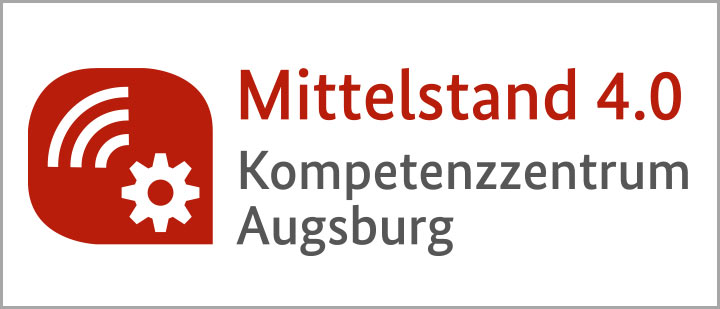The increasing competitiveness and the growing number of global players demand a high degree of innovation from Bavarian entrepreneurs, and thus also a willingness to invest and take risks. While large companies can compensate risks in research and development financially by their sales volume in many cases, medium-sized companies with the same degree of innovation are not able to bear these risks alone. Innovative breakthroughs in the area of industry 4.0 applications, such as Big Data and Smart Data, are currently difficult to achieve for Bavarian SME without professional and company-specific support.
The Federal Ministry of Economics and Energy (BMWi) wants to support small and medium-sized enterprises (SME) from production and trade with the implementation and use of digitisation and networking by providing funding in the thematic area "SME 4.0 - Digital Production and Work Processes". By overcoming deficits in the field of data collection and use, new working methods, products and value-added processes are to be opened up for small and medium-sized enterprises and craft trades, which in Germany in particular are characterised by their flexibility and inventiveness.
Based on a physical centre in Augsburg as well as three expert hubs in Garching near Munich, Regensburg and Nuremberg as a technical supplement, the competence centre aims to establish regional support networks of users, suppliers and scientists.
The access to entrepreneurs and enterprises is realised by the use of the following channels:
- A SME 4.0-truck, which is equiped with different industry 4.0 demonstrators
- A SME 4.0-academy, which offers trainings for different qualification levels
- A SME 4.0-online platform, which acts as a virtual centre providing continuous offers, information and ideas so that digitalisation solutions can find their way into companies.
The primary target group of the competence centre are small and medium-sized enterprises and crafts in the Bavarian economic area. Within the framework of the initiative, small projects to determine digitisation potentials as well as larger implementation projects are to be carried out from this target group as pilot projects. In particular, their potentials and possible areas of action are to be analysed and highlighted in an application-oriented manner.
The main focus of the competence centre is on the following topics with the associated key questions.
Business models:
- How can I implement my ideas and promote them profitably?
- How can I use new technologies and processes to increase my competitive advantage?
Production automation:
- How can machines be integrated into a flexible, automated production process with a minimum of effort?
- How can machine software, e.g. PLC programs, be created with little effort and high quality at the same time?
Intralogistics:
- How can the quality and efficiency along the supply chain from incoming goods to outgoing goods be improved?
- How can logistics systems be meaningfully planned and improved?
Work 4.0:
- How can humans be relieved simply and ergonomically by technical support systems along the production chain?
- What effects does digitization have on the activities and qualifications of production employees?
Digital trade:
- How do (wholesale) dealers or manufacturers approach digitisation projects in a targeted manner?
- How do companies present themselves professionally on the Internet?
- When should they be present on an online marketplace?
Finances:
- How can financial processes be optimally handled in the back office?
- How can companies efficiently digitize their accounting processes?
- Which payment options should merchants offer in their online shop?
